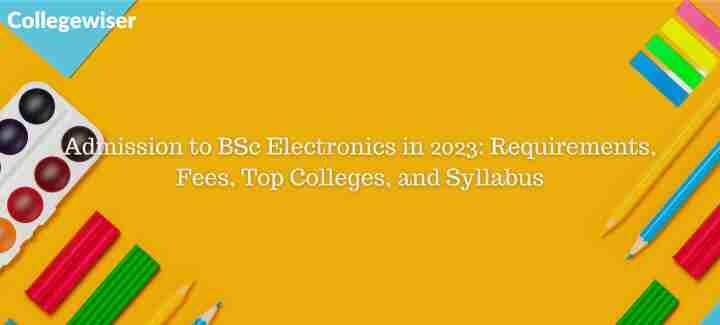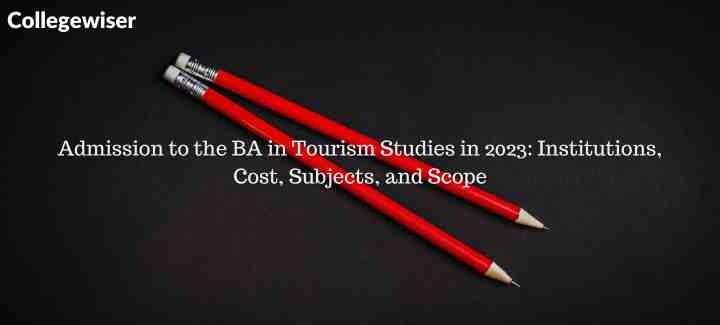Admission for BSc Electronics 2023–24: A three-year science degree at the bachelor’s level is called BSc in Electronics. Because of its significant function, the subject is appealing to pupils. A student who completed PCM 12th grade is qualified. When it comes to applying current technology, the degree is the most significant scientific field. Students take this course to get ready for a variety of jobs. Students are advised to attend The Hindu College New Delhi and SXC Ahmedabad, respectively. Students are typically offered salaries ranging from INR 2 Lakh to 10 Lakh per year (LPA).
Enquire Now!
Highlights of BSc Electronics
| Course Name | B.Sc Electronics |
| Age | No limit |
| Average Fees Incurred | INR 50,000 to 2 Lakhs |
| Average Salary Offered | INR 2 Lakh to 10 Lakhs per year(LPA) |
| Duration | Course Duration of Bachelor of Science [B.Sc] (Electronics) is 3 Years. |
| Full-Form | Bachelor of Science in Electronics |
| Minimum Percentage | 50-60% |
| Similar Options of Study | B.Sc (Physics), B.Sc (Computer Science), B.Sc (Applied Physics), etc. |
| Subjects Required | Physics, Chemistry & Mathematics |
Admission to B.Sc. Electronics 2023–24
The Bachelor of Science in Electronics program is a crucial and challenging subject. It takes almost three years to complete. If any student chooses to take this course in distance mode, the term can be extended to six years. The foundations of electronics are covered in depth in the BSc in Electronics program. The creation, maintenance, and repair of electrical appliances are all covered in this course. These appliances are now found in all industries, which has a significant impact on demand. Circuit Analysis, Electronic Devices, Analogue Circuits, Digital Electronics, Communication Lab, etc. are a few topics in the syllabus.
Eligibility
- Students who have passed 10+2 are eligible. The previous qualification must be from any recognized board with physics, mathematics, and Chemistry as the main subjects.
- BSc Electronics Admission is based on entrance exams. The exams are BHU UET, JHU University, and Bhaskaracharya College of Applied Science entrance exams. All these entrance exams also have an interview round which is also mandatory.
Fee Structure
The average fee for a B.Sc Electronics course is from INR 50,000 to 2 Lakhs, almost everywhere. It may vary from university to university.
BSc Electronics Application Form Process 2023-24
BSc electronics program is offered by various universities in India. Admission is offered on the basis of merit as well as the entrance exam. Students must secure 50% to 60% marks to be on merit or pass an entrance test to take admitted to this course. The admission process depends on the college. All the students have to apply before the end date.
Here are some entrance tests for BSc in Electronics program admission 2023:
- Jai Hind College Entrance Exam
- Sacred Heart College Entrance Exam
- Jyoti Nivas College Entrance Exam
- Ranchi University Entrance Exam
Salary Offered
An amount of INR 2 Lakh to 10 Lakhs per year(LPA) is the expected salary after completing BSc Electronics. In India, one can apply to companies such as Atomic Energy Commission, Sanmina, All India Radio, Intel, Centum, Samsung, Havel’s, LG, Jabil, Cypress, Hindustan Aeronautics Ltd., etc.
Jobs Offered
Several high-paying jobs are Electronics Technician, Service Engineer, Marketing Manager, Electronics Sales Manager, and Manufacturing Head. Other Technical Leaders, Broadcast and Sound Technician, Site Maintenance technicians, Electronics and Communication Consultant, etc.
The degree course is about the electric circuit. How they will be built? Which components do what? & most importantly, how to connect them to get the desired outcomes? The course equips the basic laws of the degree B.Sc electronics. digital communication is a result of electronic knowledge.
The degree prepares students for rewarding careers working related to electronics. The degree holder is hired to model and build the systems. These are systems that enable the world to do its job.
The criteria for the degree are like other fields with a little bit of change. The following criteria must be met for this degree.
- Students must have an education of 10+2 years.
- The minimum collective merit score is 50-60%.
- The background subjects must be biology, chemistry, and physics.
- Education must be from a recognized board.
Career Prospects
There are many options for the students after this degree programme. The engineers of this field can do the job in automotive and telecommunications, CAD technician. Graduates will be able to create high-quality digital drawings and planning.
IT consultant: IT professionals are great at problem-solving. They have superb organizational skills. They can give the best advice related to using sound knowledge about technology.
Networking specialists: A Network expert is hard, but this degree enhances networking skills and becomes one of the most eligible professionals in the networking field.
B.Sc Electronics University & Fees
| University Name | Duration | Fee | Apply |
| Yogi Vemana University | 3 years | 24825 | INQUIRY |
| Krishna University | 24425 | INQUIRY | |
| KREA University | 24400 | INQUIRY | |
| Gauhati University | 25400 | INQUIRY | |
| Dibrugarh University | 25375 | INQUIRY | |
| Cotton College State University | 25325 | INQUIRY | |
| Arunachal University of Studies | 24875 | INQUIRY | |
| Apex Professional University, Pasighat | 24850 | INQUIRY |
B.Sc Electronics Syllabus
| Year I | Year II | Year III |
| Personal Computer Computing I | Relational Database Management System | DTP |
| Personal Computer Computing II | Advance Photo Techniques | Web Designing Development Lab |
| Fundamentals of Electronics I | Environmental Studies I | Web Designing Development |
| Fundamentals of Electronics II | Electronic Communication I | Television Systems |
| Art and Production | Digital Electronics II | Principle of Journalism |
| – | Audio Production | Videography |
| – | Digital Electronics I | Corporate Communication |
| – | Electronic Communication II | Seminars |
| – | Environmental Studies II | – |




